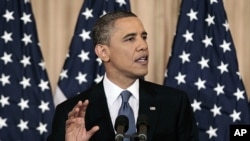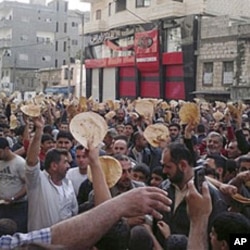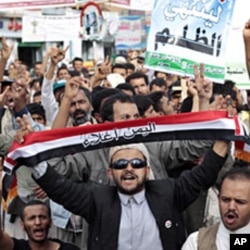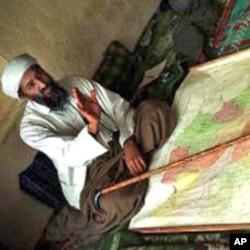In a major address on historic changes in the Middle East and North Africa, President Barack Obama says the United States stands firmly on the side of people protesting for democratic reform and against violence being used by some governments against protesters.
The president's speech, delivered at the State Department, was a combination of carrots and sticks, as he announced new aid to help democracy take root in Egypt and Tunisia, and strongly condemned Syria's president for his crackdown on peaceful protesters.
Saying the United States will speak out for core principles and universal rights, and opposes the use of violence and repression, Obama made clear where the U.S. stands on change in the region.
"We support political and economic reform in the Middle East and North Africa that can meet the legitimate aspirations of ordinary people throughout the region. Our support for these principles is not a secondary interest," he said. "Today I want to make it clear that it is a top priority that must be translated into concrete actions and supported by all of the diplomatic, economic and strategic tools at our disposal."
Syria
On Syria, where more than 850 people have been killed since the beginning of a popular uprising, Obama said the government of President Bashar al-Assad has "chosen the path of murder and mass arrests."
Obama said the Syrian people have shown their courage in demanding a transition to democracy, and he said President Assad faces a crucial choice:
"President Assad now has a choice: he can lead that transition, or get out of the way. The Syrian government must stop shooting demonstrators and allow peaceful protests; it must release political prisoners and stop unjust arrests; it must allow human rights monitors to have access to cities like Dara'a, and start a serious dialogue to advance a democratic transition," said the president.
Iran
Obama used his remarks about Syria, which he said had sought assistance from Iran, to focus on what he called the Iranian government's suppression of its own people. Saying the first peaceful protests were in the streets of Tehran, he said the U.S. continues to support the universal rights of Iran's people.
"We still hear the chants echo from the rooftops of Tehran. The image of a young woman dying in the streets is still seared in our memory. And we will continue to insist that the Iranian people deserve their universal rights, and a government that does not smother their aspirations," said President Obama.
Upheaval in region
At the same time, Obama said to be credible the United States must acknowledge that its friends in the region, referring to Yemen and Bahrain, have not reacted to demands for change in a way consistent with core principles opposing violence and supporting universal rights.
On Libya, President Obama said "time is working against" Colonel Moammar Gadhafi, adding that when he "inevitably leaves or is forced from power" a transition to a democratic Libya can proceed.
|
Obama: 4 Key Pillars in Aid to Mideast, N. Africa
|
Aid to region
To help democracy take root in countries like Egypt and Tunisia, President Obama announced new initiatives to support economic reform, modernization and investment.
These include debt relief for Egypt, and a U.S. request to the World Bank and IMF for a plan to stabilize and modernize both economies.
Obama linked the wave of upheaval across the region with un-met economic needs. "After all, politics alone has not put protesters into the streets. The tipping point for so many people is the more constant concern of putting food on the table and providing for a family. Too many in the region wake up with few expectations other than making it through the day, and perhaps the hope that their luck will change," he said.
Israel-Palestinian
Saying the Israeli-Palestinian conflict has cast a shadow over the Middle East for decades, President Obama rejected suggestions that sweeping changes in the region make it impossible to break the current impasse.
"I disagree," he said. "At a time when the people of the Middle East and North Africa are casting off the burdens of the past, the drive for a lasting peace that ends the conflict and resolves all claims is more urgent than ever."
The president said Israel and a future Palestinian state should be based on pre-1967 borders, with what he called “mutually agreed swaps so secure and recognized borders are established for both states.” But he said Palestinians must recognize that efforts to de-legitimize Israel will "end in failure" and that Palestinian leaders will not achieve peace or prosperity if Hamas insists on a path of terror and rejection.
Obama called the U.S. commitment to Israel's security unshakeable. "But precisely because of our friendship, it is important that we tell the truth: the status quo is unsustainable, and Israel too must act boldly to advance a lasting peace," he said.
Al-qaida, Osama bin-Laden
The president said historic changes in the Middle East and North Africa stand in sharp contrast to the violent ideology of al-Qaida and Osama bin-Laden, who was killed in a U.S raid in Pakistan.
Saying Bin Laden was "no martyr" but a mass murderer who offered a "message of hate" the president said the people of the Middle East and North Africa had already been rejecting the al-Qaida agenda.
"Even before his death, al-Qaida was losing its struggle for relevance, as the overwhelming majority of people saw that the slaughter of innocents did not answer their cries for a better life. By the time we found bin Laden, al-Qaida's agenda had come to be seen by the vast majority of the region as a dead end, and the people of the Middle East and North Africa had takent their future into their own hands," said Obama.
On Friday, President Obama will be able to gauge Israeli reaction face to face when he sits down with visiting Israeli Prime Minister Benjamin Netanyahu at the White House for talks on how to revive Mideast peace efforts.








